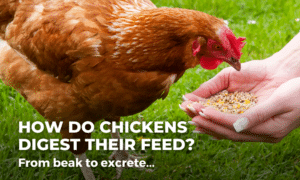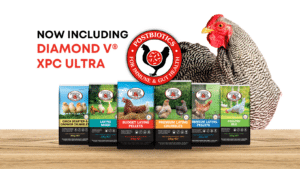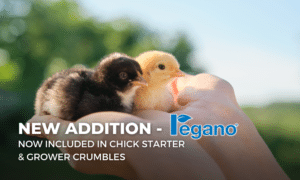
04 Jun Feeding Chickens for Warmth in Winter
The winter weather is upon us and it might be time to adjust how you feed your chickens to help with warmth. Did you know chickens are actually better at tolerating cold temperatures than they are with heat? Even still, their nutritional requirements change as the temperature drops. There are a few easy things you can do to feed your chickens for warmth, and get them through winter healthy and happy.
What changes in winter
When the outside temperatures decrease, chickens (and most animals) lose heat from their bodies, so they need to increase their internal body temperature to compensate. But increasing their internal temperature takes quite a bit of energy!
This energy comes from their diets, from digesting carbohydrates, protein and fat. Chickens are pretty good at regulating how much they eat and they can increase their consumption to match their needs. But for this to work, we need to make sure the food is available to them!
Did you know: their dietary intake can increase by 25% – 50% in winter!
1. Provide their feed ad-lib
You should provide your chickens with their feed ad-lib. Ad Lib (meaning ‘as desired’) allows your chooks to self regulate, and eat as much as they need.
The average laying hen needs 100g of feed per day and cold temperatures can increase her consumption.
2. Provide a quality, complete feed
When it’s colder, chickens rely on burning protein, fat and carbohydrates to stay warm. So in winter it’s important to provide them with a high quality, complete feed that is high in protein.
This will make sure all her nutritional requirements are covered, and support her health, metabolism and egg laying. Most chooks will have just gone through a moult (losing and re-growing feathers) so will need extra protein and fat to replenish their stores.
What is enough? The minimum daily requirement is 15% protein (i.e. 15g of their 100g). We offer a number of high protein feed options, that can help to support the extra needs in winter.
3. Prioritise feed, not scraps
If you supplement your chickens diets with scraps, make sure you offer a complete feed to them first so they get all of their vital nutrients.
Scraps are a great treat, but they are not concentrated sources of nutrition. Chooks can often fill up on scraps without getting a lot of nutritional value.
4. feed before foraging
If you let your chickens out to forage, be aware that the food they would normally find might not be there. Insect populations tend to decrease during winter, and insects are a source of protein, so make sure they are getting enough protein from their feed.
It’s a good idea to feed them a complete feed first thing in the morning before letting them out, to ensure they get the nutrients they need for the day.
5. Give them a feed before bedtime
Chickens don’t tend to eat at night, so you can offer them feed again around half an hour before they would normally go to bed.
This can help them produce internal warmth for the cold night ahead.
Why are my chooks laying less?
Winter is a time when chooks will often decrease or stop laying due to the decreased daylight hours. It’s their way of giving their bodies a break to prepare for spring. It’s also an evolutionary feature, because in the wild chicks wouldn’t have a high survival rate in winter.
But cold temperatures can also be impacting egg laying, as chooks are diverting their energy and resources into staying warm. Keeping them well fed with a quality, high protein feed will make sure they are getting what they need, and support health and laying.
Read more about why your chook might have stopped laying…
Feathers - better than a down jacket!
Did you know that your chooks feathers are actually very good at keeping them warm?
- Their feathers act as a layer of insulation and protect them from the elements.
- Chooks can fluff their feathers up to trap air, which then warms up and creates an extra layer of insulation.
- Their feathers also have an oil coating which helps to waterproof them.






No Comments